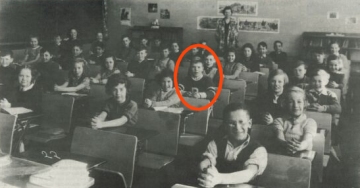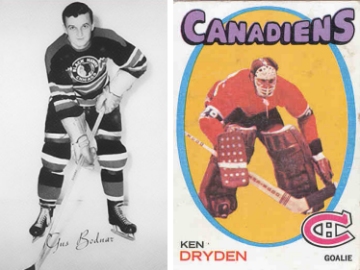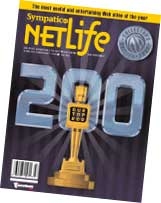I’m in a phase where I’m thinking that the Kit Kat may be the perfect chocolate bar. This happens to me about every 3 years or so. When I’m off the Kit Kat, I alternate back and forth between Skor and Laura Secord French Mint. And once in a blue moon I get a hankering for a Caramilk.
One of the places I originally left off the Businesses We Support list was Sporting Intentions on North River Road in Charlottetown (it’s on the list now).
We’ve purchased a canoe from them, and life jackets, camping gear, and today a back pack for our upcoming trip overseas. Their staff have been universally helpful: they know their products and are good at communicating about them. There’s a lot of product that you can only buy at their shop if you want to get it on the Island too, and they’ve a good selection of most items.
They do tend towards the “outdoorsy” rather than “sporty” part of their name: canoeing, kayaking, cycling, skiing, camping, hiking rather than hockey, softball or soccer. If you want to buy a tent or a kayak, though, and don’t mind paying for quality, they’re the best.
I also left off Smooth Cycle, the cycle shop just up the street that I wrote about earlier here. If you need a bike, they’re good. I’ve added them to the list too.
Wee Oliver had his 15 month checkup and immunizations at Public Health here in Charlottetown yesterday. I can’t say enough good things about the people at Public Health: they are a bunch of caring, knowledgeable professionals who are making raising a child that little bit easier.
We take their services for granted here on the Island, but their role is diminished or non-existent in other jurisdictions. Our friends in Nova Scotia, for example, didn’t get a helpful series of home visits from a public health nurse during the first months of their child’s life like we did.
And yesterday we learned of a new benefit: for $15/year, the Province will cover the cost of Oliver’s regular dentistry from now until the time he’s 17 years old. I remember the child dental benefit being held up as a campaign promise by the David Petersen Liberals back in the late 1980s in Ontario and going nowhere; it’s surprising (and heartening) to see that the dream came alive here on PEI.
Back in 1998, Christine Lahti was in the washroom when it was announced that she’d received the award for Best Performance by an Actress in a TV-Series - Drama.
Four years later, this one episode has resulted in an NBC promotional campaign that calls the Golden Globes “the most unpredictable awards show in town.”
The problem here is that now stars are expected to be goofy and foolish, and so you get a sort of forced humour that bears little resemblance to the humour resulting from the original pee. Too bad.
Trivia: Ms. Lahti is married to Thomas Schlamme, Executive Producer of The West Wing and Sports Night, the latter of which was a very funny and well-produced show.
I’ve added a new Businesses we Support page to the website. It contains a list of reliable local businesses with good customer service that we do business with on a regular basis. I’ll add to it (and subtract from it, if required) over the days and weeks to come. You’ll find a handy link over to the left in the sidebar under We Support.
The image below, from the Cochrane Times-Post (formerly the Northland Post) shows hockey and donut great Tim Horton at Central Public School in Cochrane, Ontario in the late 1930s. He’s the kid in the second row from the right in the hockey sweater. Photo courtesy of my mother, who went to the same school.

My family’s association with hockey isn’t limited to that admitedly indirect connection. We count both Gus Bodnar and Ken Dryden as our cousins.

Gus Bodnar, related through my father’s mother, holds the record for fastest goal by a rookie in his first NHL game, and won the Calder Memorial Trophy in 1944. He played in the NHL for Toronto from 1943 to 1946, then Chicago from 1947 to 1953 and Boston for a single season in 1954.
Ken Dryden, related through my mother’s mother, also won the Calder Memorial Trophy, in his case in 1972. He played for the Montreal Canadiens from 1970 to 1979.
And it doesn’t even stop there: another northern Ontario boy, dubbed Rocky Rukavina as a player, ‘though not related directly to us, also had his time in the spotlight. You can hear more about him (and the connections above) in this CBC feature [RealAudio] that aired last year.
And finally there’s the Frank Rukavina Arena in Silver Bay, Minnesota (an area near and dear to Buzz Bruggeman’s heart).
Irony of ironies, I find myself unable to watch, play, or express any interest in the game (beyond these family interests). This is more than I can say for my brother Johnny.
There have been a lot of princes, and so as a result, a lot of streets named Prince Street. Our own World Headquarters is at 100 Prince Street here in Charlottetown. Out there in the world at ‘100’ on other Prince Streets you can find:
- Miu Miu, New York City, MA
- Anzalone Realty, Boston, MA
- Streets Department, Desoronto, ON
- Northeast Renault Owners Registry, Fairfield, CT
- Dumont Metal Stamping, Inc., Paterson, NJ
Davey Moses and his gang of creatives at Moses Media produced a nifty Christmas greeting for Island Tel. And they have a nice new website design for the new year.
 Back in November I wrote about the importance (and delight) of cleaning your glasses well.
Back in November I wrote about the importance (and delight) of cleaning your glasses well.
Yesterday I took my glasses into Ron Boyles at Boyles Optical because they were falling off my face.
Too many episodes of sitting on them, having Oliver pull them off my face and try to eat them, etc. had put them out of alignment.
Ron took my glasses out to his secret laboratory in the back, spent five minutes with them, and returned to spend another couple of minutes fitting them to my head.
The result is wonderful: my glasses not only no longer fall off my head, but they appear to fall in the best possible location to allow their optical magic to work.
Ron also cleaned my classes using special optical potions (I think), and they are sparkling clean.
Ron says you should have your glasses adjusted every 4 or 5 months. I think he’s right.
Although Oliver and I received some minor local renown for our Compass “today’s Island weather brought to you by…” Vogue Optical singing, Catherine and I both get our glasses from Boyles Optical, and can highly recommend their services. They’re in the Polyclinic, right across the hall from Lawton’s drugstore.
 Congratulations to our client The Old Farmer’s Almanac for being named one of NetLife magazine’s Top 200 of 2001 websites.
Congratulations to our client The Old Farmer’s Almanac for being named one of NetLife magazine’s Top 200 of 2001 websites.
NetLife’s review of the site is as follows:
The well-designed site includes layers of interesting facts on gardening, weather and astronomy from the folks who’ve been predicting the weather since 1792. Features such as Weekly Wisdom and Trusted Tips are eclectic fun.
The folks at The Old Farmer’s Almanac are a joy to work with, and their web team deserves this recognition. Bravo!
 I am
I am